While strong winds and chilling rain swept through Lekwungen territories in Victoria, B.C., on Thursday evening, Indigenous youth remained steadfast in their determination for justice for the Wet’suwet’en. February 6 was the first day of what would become an ongoing, Indigenous youth-led occupation of the ceremonial gates and steps to the B.C. Legislative Assembly. Indigenous youth are camping out on the steps of the building in solidarity with the Wet’suwet’en Nation, who are now on their sixth day of resisting a violent RCMP invasion of their sovereign territories.
“We as Indigenous youth are occupying because we understand that what the Wet’suwet’en are doing protects our collective future” explains 19-year-old Ta'Kaiya Blaney of Tla’amin Nation. “If Canada is willing to exercise lethal overwatch, shoot and kill Indigenous land defenders to push a pipeline through, that sets a precedent for all Indigenous nations around the world. We are not anti-pipeline protesters. This is about us defending Indigenous lands and Indigenous sovereignty.”
“We as Indigenous youth are occupying because we understand that what the Wet’suwet’en are doing protects our collective future.”
On Thursday before dawn, the RCMP invaded sovereign Wet’suwet’en lands, to allow for the construction of Coastal GasLink’s $6.6-billion fracked gas pipeline. Over 20 land defenders have been arrested. Despite a 1997 Supreme Court decision which upheld that the Wet’suwet’en never ceded their lands to the Canadian settler state and recognized their right to govern their lands, the B.C. provincial government and the B.C. Supreme Court are upholding interpretive fallacy by granting Coastal Gaslink an injunction and access to Wet’suwet’en territory without their consent. This injunction ignores Wet’suwet’en law, undermines Indigenous sovereignty, and directly defies the United Nations Declaration on the Rights of Indigenous Peoples (UNDRIP).
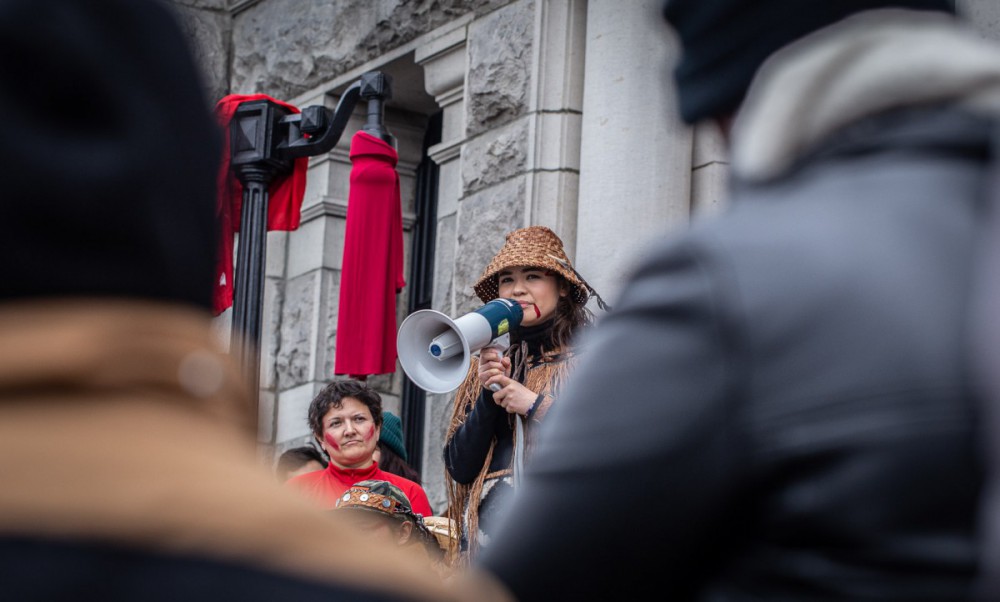
Dozens of youth, wrapped in blankets, gathered around a ceremonial fire on the legislature steps. The sound of their drums and songs reverberated down the street.
Some youth sat on the legislature steps with their arms in lock boxes, draped with cedar. A large banner that hung behind them read, “First they took the children from the land, now they take the land from the children.”
Kolin Sutherland-Wilson, a youth organizer from the Gitxsan Nation, explained the significance of their action. “How would Canada feel if we infringed on its sacred spaces? This space here is on stolen land; it is the territory of the Lekwungen Nation. We are reclaiming this space and pointing out the real colonial origins of Canada. Canada acts as a colony using military force to invade nations, displace people, and extract wealth from their territories.”
Support tents lined the walkway, maintained by land defenders, water protectors, family, friends, and allies. Everyone took support shifts throughout the day and late into the night by bringing food and tea, and bearing witness.
While B.C. premier John Horgan has said that the project garnered necessary support through permits and Wet’suwet’en leaders, the project only received approval from elected band councils – who are granted authority and funding through the colonial Indian Act – not the traditional Wet’suwet’en leaders. According to University of British Columbia professors, “The plaintiffs in the landmark Delgamuukw case before the Supreme Court were the hereditary chiefs, not the band councils. The court accepted detailed evidence of the Wet’suwet’en hereditary governance system and confirmed that the Wet’suwet’en never surrendered title to their ancestral lands.”
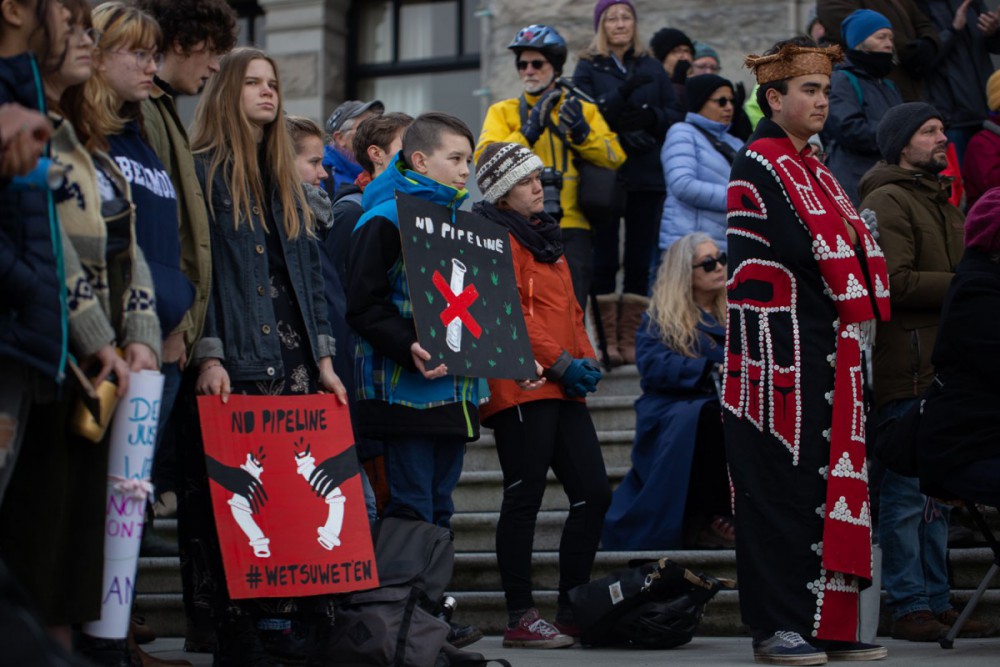
Even so, Horgan has said the “rule of law” must prevail, that the project “has every right to proceed,”and “British Columbia is moving on.”
Sutherland-Wilson explains, “We have to deconstruct this narrative Canada is creating regarding the elected band councils and Wet’suwet’en Hereditary Chiefs. Even the English language is so problematic when applying to this – the leaders of the Wet’suwet’en are the Dinï ze' and Ts'akë ze'. [The term] 'Hereditary Chiefs' is a colonial imposition on Indigenous leadership – In no way are the Dinï ze' and Ts'akë ze' a form of monarchy, there is so much accountability and responsibility to the people.”
The Dinï ze' and Ts'akë ze' (Hereditary Chiefs) have called for a work stoppage on the Coastal GasLink project, which would force its way through their territory and turn pristine forests and salmon streams into a fossil fuel corridor. Coastal GasLink already bulldozed through Wet’suwet’en territories last year, destroying archaeological sites and occupying their land with industrial man-camps. If Coastal GasLink were to be built, it would lock in decades of fossil fuel extraction at a time when scientists are warning of imminent climate change catastrophe unless all countries rapidly scale down production of fossil fuels.
Even so, Horgan has said the “rule of law” must prevail, that the project “has every right to proceed,”and “British Columbia is moving on.”
On Tuesday, February 11, Indigenous youth continued to occupy the legislature for over 100 hours in support of the Wet’suwet’en.
Solidarity actions have been taking place across Turtle Island and around the world, with events being held from Sweden to Australia. In Victoria, B.C., over 100 supporters of the Wet’suwet’en blocked the B.C. ferries in early January and shortly after, Indigenous youth occupied the Ministry of Energy, Mines, and Petroleum resources for 18 hours before Victoria police arrested and detained 11 youth and one Elder. In Toronto, Indigenous youth and allies are currently occupying the office of Liberal MP Carolyn Bennett, the federal Minister of Crown-Indigenous Relations. In Winnipeg, members of Indigenous Youth for Wet'suwet'en occupied the office of MP Dan Vandal. In Edmonton, members of the same group held a rally in the Bank of Montreal, calling on the bank to divest from Coastal GasLink. Land defenders in B.C. blocked access to two ports in the Vancouver area, leading to a court injunction and 57 arrests, and there have been many other sustained blockades of railways, bridges, and roads.
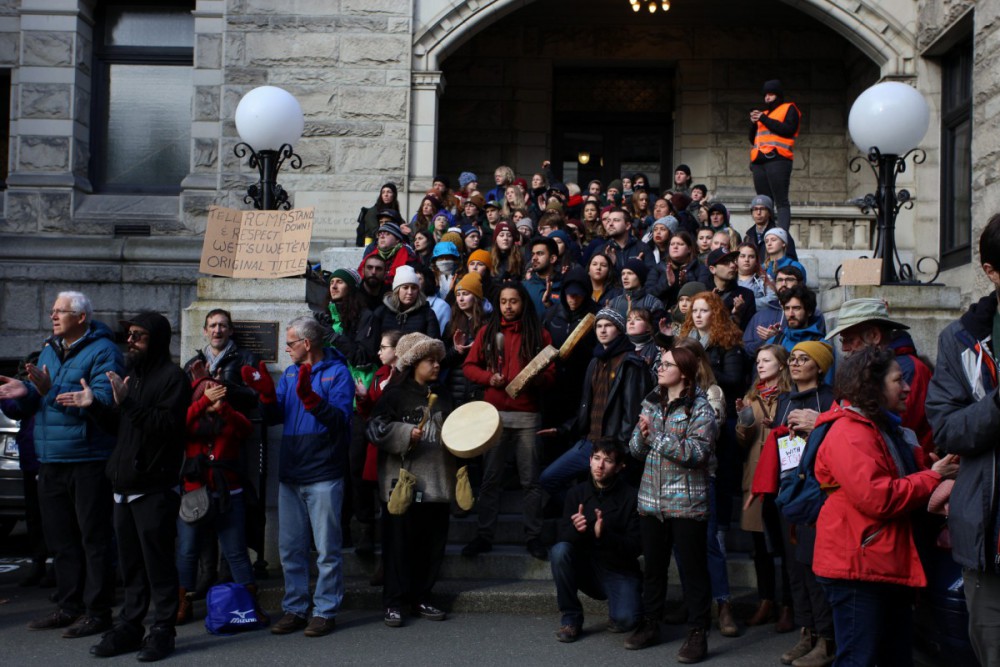
The coalition of Indigenous youth leaders are making their voices heard. As of February 8, all levels of Canadian government – federal, provincial, and municipal – came to hear the demands of Indigenous youth in solidarity with Wet’suwet’en. Federal NDP MP Laurel Collins and NDP leader Jagmeet Singh have been formally invited to stand with the Indigenous youth on February 11, when the B.C. legislature is due to open. As a result of the occupation, the legislative assembly has cancelled the lieutenant-governor’s red carpet arrival and 15-gun salute traditionally held before the province’s throne speech.
“I’m going to be out here all night in this cold weather because I have to, because of the land I love, the Elders I love, the language I love.”
Last week, Hereditary Chiefs representing all of the five clans of the Wet’suwet’en unanimously supported a legal action, which seeks a Judicial Review of a project extension for the Coastal Gas Link pipeline, granted by the B.C. Environmental Assessment Office last October. The legal action argues that B.C.’s Environmental Assessment Office failed to properly assess the Coastal Gas Link project’s potential harms, including the risk of increased gender-based violence caused by transient pipeline workers and industrial camps, in accordance with the findings and calls to action of the Inquiry into Missing and Murdered Indigenous Women and Girls. This is based on the Inquiry’s final report of June 2019 which found that resource extraction is linked to spikes in violence against Indigenous women, girls, and Two-Spirited people, and called on governments to conduct a gender-based harms analysis prior to approving projects.
On Monday, February 10, two Wet’suwet’en Houses launched a second legal challenge, asking the Federal Court to declare that Canada has a constitutional duty to keep the country’s greenhouse gas emissions well within the Paris Agreement limit of 2C above pre-industrial levels. If successful, the lawsuit could lead to far-reaching changes to Canada’s environmental legislation. It would enable the federal cabinet to cancel approvals previously given to fossil fuel projects such as Coastal Gas Link, liquefied natural gas terminals, and others.
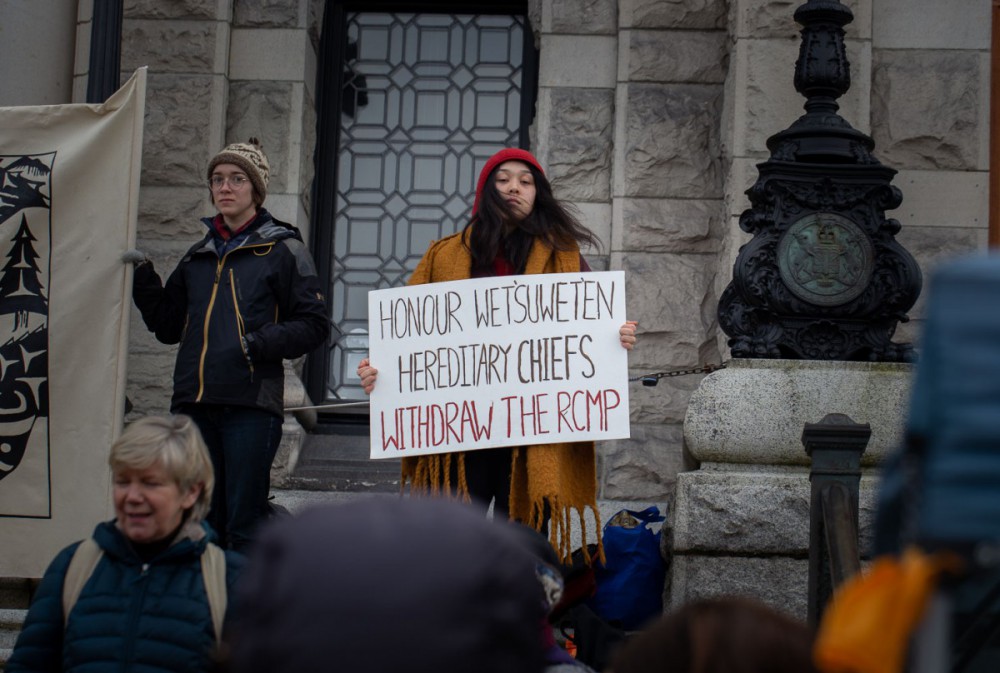
“I’m going to be out here all night in this cold weather because I have to, because of the land I love, the Elders I love, the language I love,” says Sutherland-Wilson. “Everyone here has extremely similar stories to mine because all of our nations have been subject to the same unilateral imposition of colonialism, the oppressive legacy of Canada.”
He adds, “Our parents fought for our rights, our grandparents fought for our rights, our great-grandparents [too]. Every inch of recognition we have earned from the Canadian government has been hard fought. Canada has never ceded it without us forcing them to do so. It’s our generation’s turn to stand up and do it.”


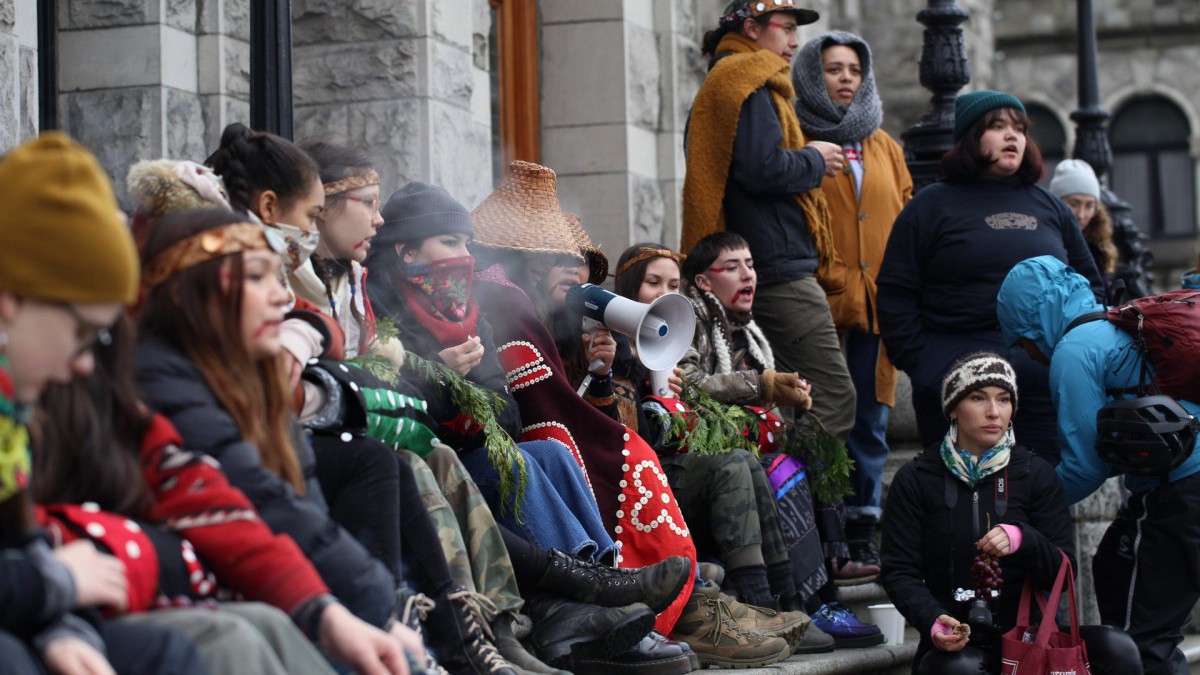
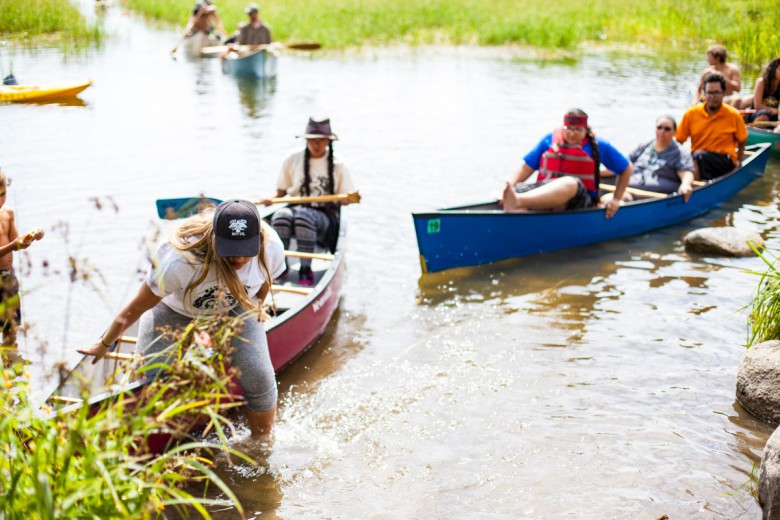
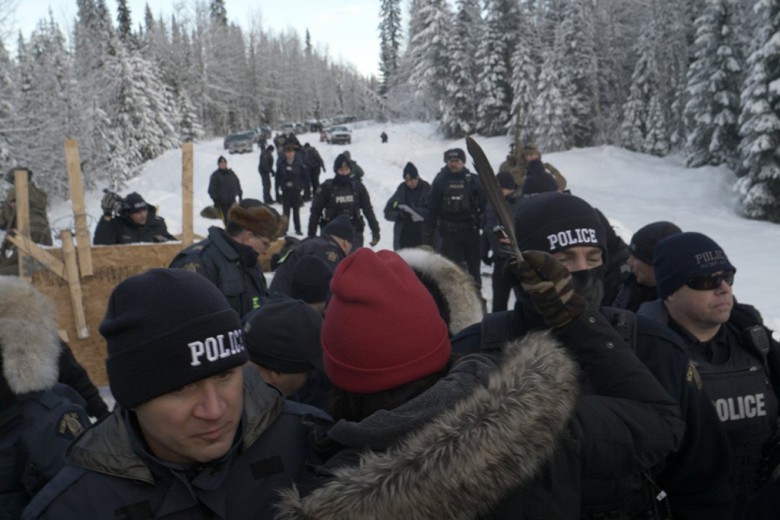
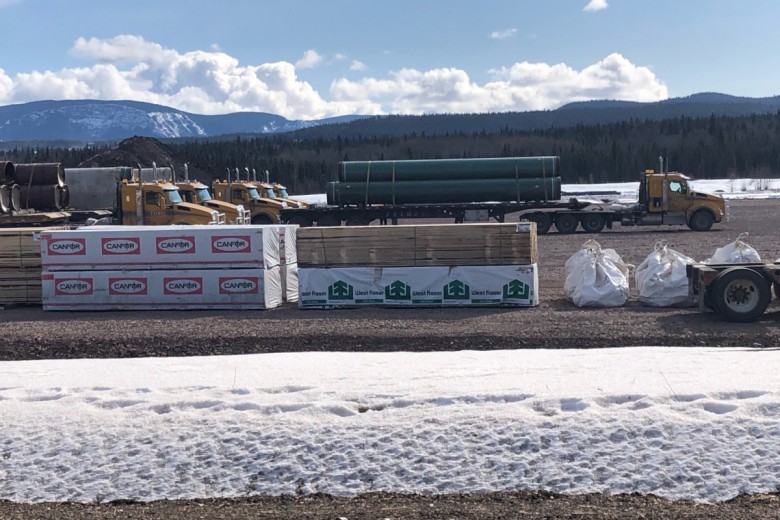
_780_520_90_s_c1_c_b.jpg)
